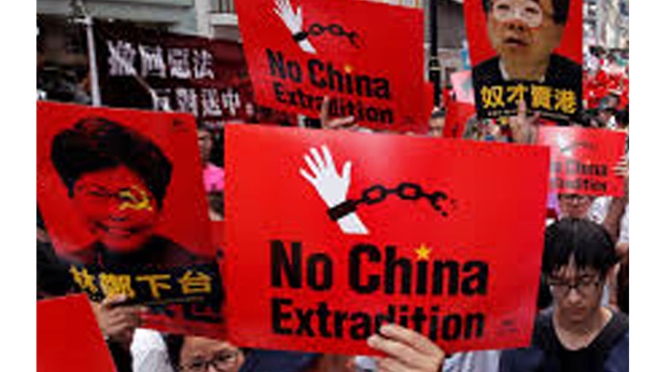THE UNSOLVED DILEMMA OF THE HONG KONG EXTRADITION BILL
Posted on : August 4, 2019Author : AGA Admin

For nearly two months, the semiautonomous city of Hong Kong has convulsed into demonstrations almost every day, in what has become the territory’s worst political crisis since it was returned to Chinese rule in 1997. The rallies were sparked by an unpopular extradition bill, now shelved, that has come to symbolize broader concerns about Beijing’s encroachment.
It all began when a couple from Hong Kong went for a short trip to Taiwan. On his return to Hong Kong the 19-year-old man was arrested by the Hong Kong police on charges of having killed his girlfriend during the trip and dumping her body near a Taipei subway station. The legal quagmire of whether he would face trial in Hong Kong or China subsequently resulted in mass protests that addressed questions much larger than the rights of a single individual.
After taking over Hong Kong in a war in the 1800’s Britain returned it to China in 1997 with the stipulation that the city would govern itself for the next 50 years before fully entering under Beijing’s control. The expectation was that till 2047 the city and the mainland would operate under the principle of ‘one country, two systems’. When Hong Kong’s extradition laws were finalized in 1997, Taiwan and China were not included because the mainland had a fundamentally different criminal justice system in place but also because of concerns about human rights record of the mainland.
The proposed amendments would give Carrie Lam (Chief Executive, Hong Kong) the authority to decide on a case by case basis whether a criminal should be extradited to a place with which the city has no formal extradition agreement. This in itself is problematic as the as the city’s Chief Executive is not elected by the people but picked by a committee appointed by Beijing. What makes it more problematic is that the city’s courts would have little power to reject the extradition request and more significantly the amendment would come into force retroactively with the added implication of putting at risk thousands of individuals who may have been be targeted by China.
Supporters of the bill note that certain financial crimes will not be included in the bill and that it would deal with offences that are illegal both in Hong Kong and the state where the person will be extradited. However, the protests are not just about the Bill but also about the increasing Chinese control over the semiautonomous city. And this is not the first instance of such protest. In 2012 thousands of protestors surrounded the government headquarters after a proposal to include more pro-Chinese material in school curriculum. In 2014 there were demonstrations when a new election law allowed a Beijing backed committee to elect the Chief Executive, the law that placed Carrie Lam in power in 2017.
Amidst questions about how the central government could have been caught unawares Lam declared the bill ‘dead’ but did not resign. She argued that the amendment was meant to rectify the “geographical restriction” in the current law, whereby it is not possible to transfer a suspect to Taiwan or a neighboring mainland China and Macau. Secondly there is no workable arrangement for the surrender of a fugitive offender to 170 jurisdictions which have not entered into a long-term agreement with Hong Kong. These, along with the fact that the man accused of killing his girlfriend would have got away scot free were the original purposes of the government in putting forward the legislative proposal, the Fugitive Offenders Ordinance and The Mutual Legal Assistance in Criminal Matters. According to her, the amendments would have been based on the existing legislation, with relevant human rights and procedural safeguards, including the role of the court and fair and impartial judicial system of Hong Kong being fully maintained.
Further amendments proposed that the state will take out nine categories of offences from the list of offences and lift the threshold for the punishment of the offences from imprisonment for more than one year to more than three years. Secondly, after the introduction of the bill in the legislative council a number of additional human rights that are in line with international standards would be introduced. The protests though have continued unabated and according to retired Singapore diplomat Bilahari Kausikan, they result from the disquiet of the people of Hong Kong with Beijing’s sway over the city and a desire to be identified as separate from China.
In fact, the recent protest is part of a long term resistance movement to keep the city as independent as possible. However, while the motivations, implication and results of this specific protest is different it follows a recent global trajectory where protests have been spontaneous, largely leaderless and with little attachment to traditional political groupings or ideology.
Somya Kumari
Intern





Leave a Reply